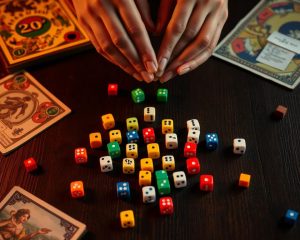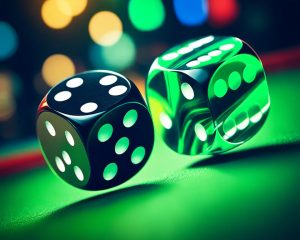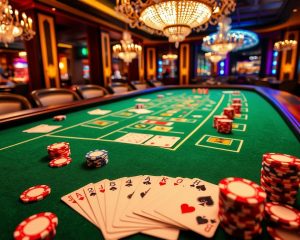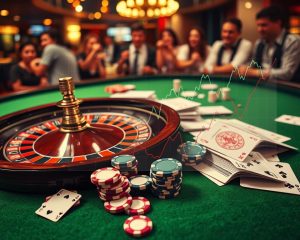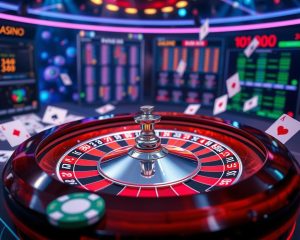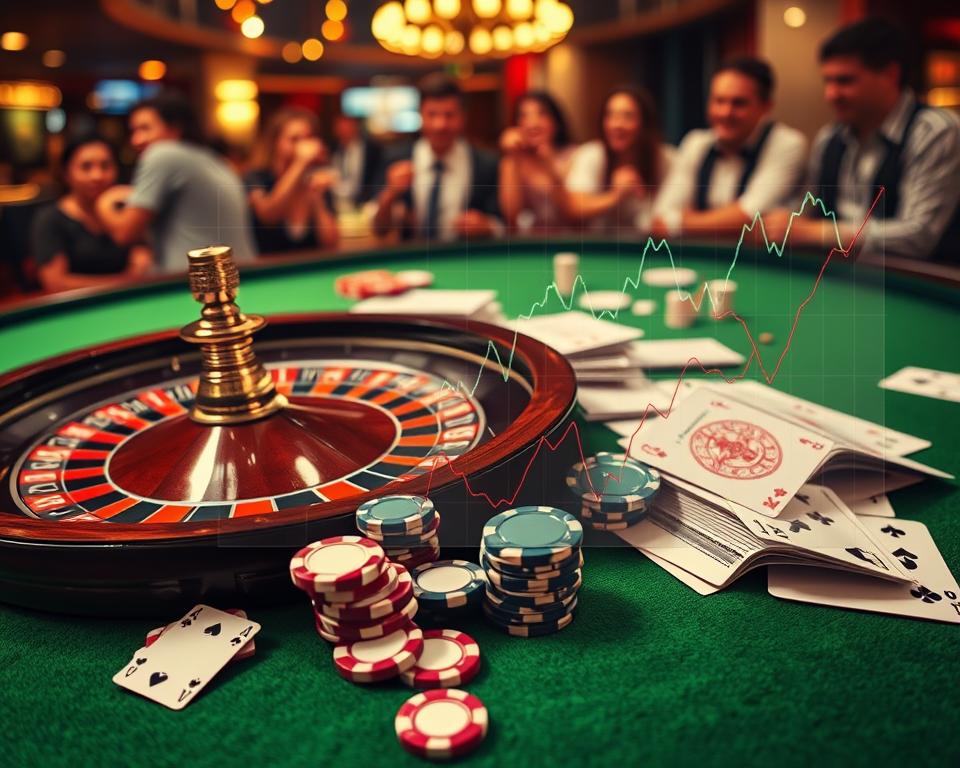
Many people wonder how often gamblers win. This question fascinates both new and experienced players in casino games and sports betting. We will look into the real chances of winning at gambling. We’ll explore the house edge, game probabilities, and how often players win in different betting situations.
It’s important to understand the math behind gambling to have realistic expectations. We’ll examine the house edge, which helps casinos and bookmakers win. We’ll also talk about probability and the Gambler’s Fallacy. This myth can lead to bad decisions and unrealistic hopes.
In this article, we’ll share insights on the win rates and payout frequencies of popular casino games. We’ll focus on slot machines and table games to reveal the truth about gambling outcomes. We’ll also discuss how luck and strategy work together. This will help readers make better choices and possibly improve their chances of winning.
By the end of this article, you’ll have a better grasp of the math behind gambling. This knowledge will help you approach casino games and sports betting with a clearer understanding. You’ll be able to enjoy this exciting, yet risky, activity with a more balanced and responsible mindset.
What Are the Odds of Winning at Gambling?
Understanding the odds of winning at gambling is key. The house edge is a big part of this. It shows how likely a player is to win.
Understanding the House Edge
The house edge is the casino’s advantage over players. It’s the percentage of bets the house keeps over time. This edge changes with each game, from a small fraction to over 20%.
The bigger the house edge, the harder it is for players to win.
Probability and Gambler’s Fallacy
Gambling probability and the gambler’s fallacy also matter. The gambler’s fallacy makes players think past results affect future bets. But each bet is a new, independent event.
Knowing these ideas helps players make better choices. It stops them from falling into common traps about winning.
“The house doesn’t beat the player. It just gives him the opportunity to beat himself.” – Attributed to Nick the Greek, a famous American professional gambler.
By understanding the house edge and probability, players see their chances more clearly. This knowledge helps them make smart choices. It also makes gambling more fun and responsible.
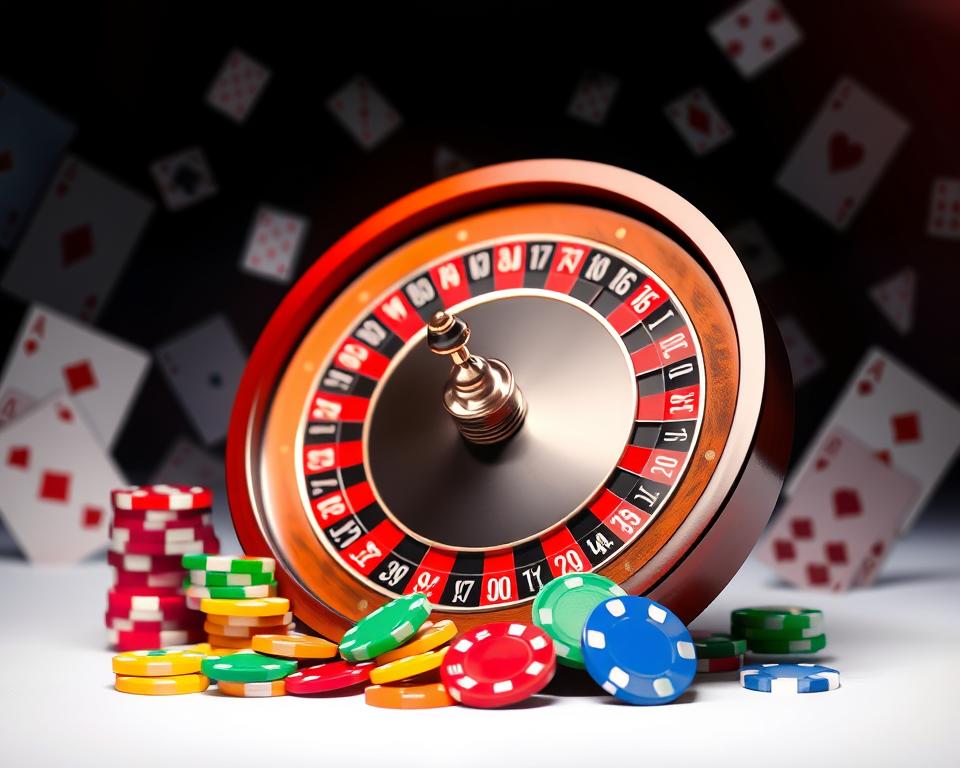
Casino Odds and Payouts
Understanding casino odds and payouts is key for smart gambling. The casino always has a slight edge over players. Knowing this helps gamblers make better choices and set realistic goals.
The house edge is at the core of casino games. It shows the casino’s advantage over players. For example, blackjack has a low house edge, between 0.5% and 1%. But, slot machines have a higher edge, with payouts around 85% to 95%.
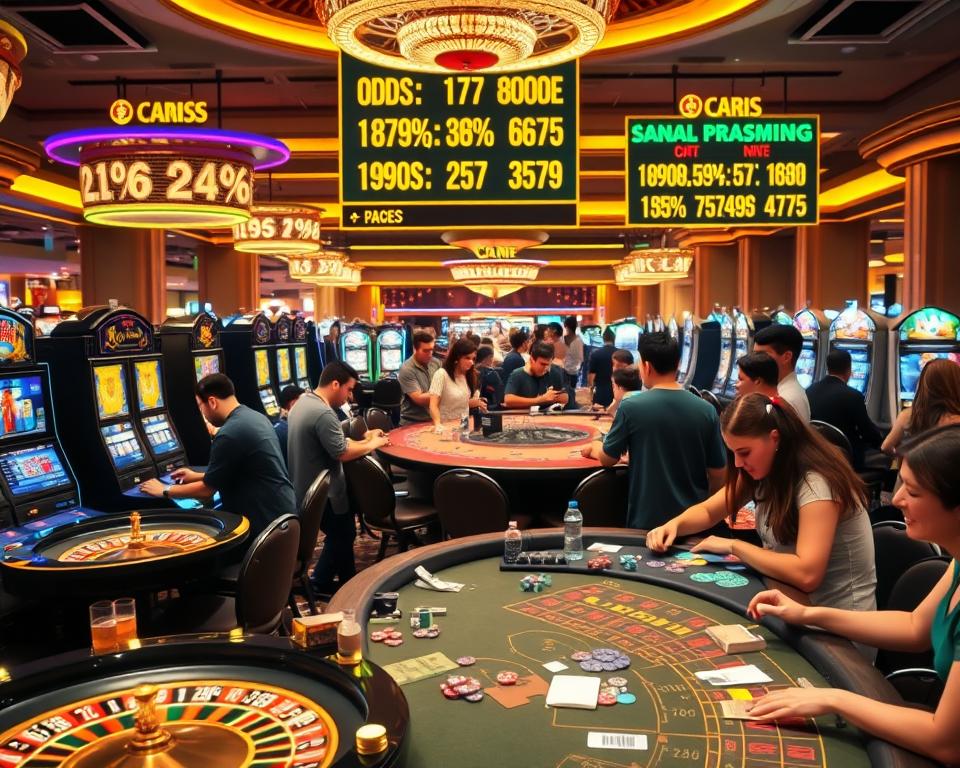
But, the house edge isn’t the only thing that matters. Probability also affects game outcomes. The chance of winning changes with the game, rules, and player skill. Knowing these probabilities helps gamblers make smarter choices.
“The house always wins in the long run, but that doesn’t mean you can’t enjoy the thrill of gambling responsibly.”
In the end, casino odds and payouts aim to balance fun and fairness. By understanding the math behind games, gamblers can enjoy more while taking fewer risks.
Gambling Statistics: How Often Do Players Win?
Many people wonder how often gamblers actually win. The answer lies in gambling statistics. These statistics give a clear view of the odds gamblers face in different casino games and betting formats.
Slot Machine Win Rates
Slot machines are a big part of casino fun, with their bright graphics and big win promises. But, the slot machine win rates show a different truth. Data shows that the average return-to-player (RTP) for slots is between 92% and 97%. This means players can expect to lose $3 to $8 for every $100 they bet in the long run.
Table Game Win Frequencies
While slot machines are flashy, table games like blackjack, roulette, and baccarat offer different odds. Research shows that table game win frequencies can change a lot, based on the game and the player’s strategy. For example, skilled blackjack players might have a house edge as low as 1%. But, roulette players face a 2.7% house advantage on even-money bets.
The gambling statistics show a complex picture. They reveal that while winning big is exciting, the house usually wins in the long run. Knowing these odds helps players make better choices and set realistic expectations when playing at casinos.
The Role of Luck vs Strategy in Gambling
In the world of gambling, the debate between luck and strategy is always ongoing. Some games rely on chance, while others need skill and smart decisions. Knowing how to balance these two is key for anyone wanting to win at the casino.
Games like slot machines and roulette depend a lot on luck. Their outcomes are random, making it hard for players to change the results. On the other hand, games like blackjack, poker, and baccarat allow for strategic play. Here, a player’s smart choices can greatly improve their chances of winning.
“In gambling, the win is not as important as the thrill of playing the game.”
Even though luck is big in many games, smart players know strategy can help a lot. By learning game rules, improving skills, and using good betting strategies, players can win more often. This way, they can reduce the impact of chance.
Finding the right mix of luck and strategy in gambling is tricky. Each game has its own challenges and chances. The best gamblers know how to use both luck and strategy. They aim to balance their skills and knowledge to succeed in the unpredictable world of chance.
How Often Do Gamblers Win? Betting Odds Explained
Gambling is a fun activity, but many don’t understand the odds of winning. The truth is, how often do gamblers win depends on the house edge and game probabilities. Knowing these factors helps set realistic goals and make smart gambling choices.
The house edge is a big factor in gambling odds. It’s the casino’s advantage over players. Games like blackjack have a low house edge, while slots have a high one. Generally, the higher the house edge, the less likely you are to win.
Understanding the probability of game outcomes is also key. For instance, rolling a 7 in craps is more likely than a 2 or 12. Knowing these probabilities helps players make better bets and manage their hopes.
“The house doesn’t beat the player, it just gives him the opportunity to beat himself.” – Zig Ziglar
Looking at gambling statistics shows the truth about winning. About 90% of players lose money over time. This is because of the house edge and the unpredictable nature of gambling games.
While some may get lucky, the data shows most gamblers don’t win often. Playing responsibly, like setting a budget, can help. It can make the experience more enjoyable without big losses.
Casino Advantage and Player Disadvantage
In the world of gambling, it’s key to grasp the casino’s edge over players, called the house edge. This edge is a key part of casino games, making sure the casino makes money over time. Players need to know the casino advantage and player disadvantage to make smart choices and maybe win more.
Mitigating the House Edge
While we can’t get rid of the house edge completely, there are ways to lessen its effect. By learning about each game’s edge, players can make better choices and cut down their disadvantage. Some good ways include:
- Picking games with lower edges, like blackjack, baccarat, and some video poker.
- Learning game strategies to lessen the casino’s edge.
- Using bonuses and promotions to balance out the house edge.
- Playing responsibly by setting limits and managing money well.
It’s vital to remember that these strategies can help, but they can’t change the basic math of gambling. The house edge is a key part of the casino’s business. Players should gamble knowing the risks.
“The house always wins in the long run, but the goal is to maximize your short-term winnings and minimize your losses.”
By understanding the casino advantage and using smart strategies, players can enjoy gambling more. They can also play in a way that’s safe and fun for them.
Gambling Winnings Frequency: A Realistic Perspective
The dream of big wins in gambling can be very tempting. But, the truth is, most players don’t get rich. Understanding the gambling winnings frequency is key to seeing the real odds of gambler win rates.
Big wins in gambling are rare. Most players, even those who go to casinos often, lose more than they win. Casinos have an edge, making it hard for players to win.
“The house always wins in the end. Gambling is a game of probabilities, and the odds are simply not in the player’s favor.”
Wins do happen, but they’re mostly luck. The gambling winnings frequency follows a bell-shaped curve. Most players see small wins and losses, while a few get big wins.
It’s important for gamblers to be realistic. The gambler win rates are usually low. Big, consistent wins are rare. By setting realistic goals and managing money well, players can handle the risks of gambling.
Maximizing Your Chances of Winning at Casinos
The dream of winning big can be tempting. But, a smart gambling strategy is key for casino fans. Knowing the math and using practical methods can help improve your odds, even with the house edge.
Responsible Gambling Practices
Starting with a responsible gambling mindset is essential. It means setting clear bankroll limits, taking breaks, and controlling your emotions while playing.
- Stick to a budget you can afford, never spending more than you can.
- Set time limits for your casino visits and leave when time’s up.
- Remember, the house always has an edge, and short wins don’t mean long-term success.
Following these steps can make your casino experience better and safer. It helps you keep your winnings and enjoy the game more.
“The house doesn’t beat the player. It just gives him the opportunity to beat himself.” – Nick the Greek
There are also proven strategies to reduce the house edge and boost your winning chances. These include choosing the right games, managing your bankroll, and understanding game probabilities.
The secret to winning at casinos is finding a balance. Enjoy the game but also be disciplined with your gambling strategy. This way, you can have a fun and rewarding casino experience.
Gambling Probability: A Mathematical Approach
Gambling is a world where math and probability are key. Knowing how odds and payouts work in casino games is vital. It’s important for serious gamblers and those curious about the gambling industry.
Calculating Odds and Payouts
At the core of gambling is figuring out odds and payouts. Gamblers need to understand probability to make smart choices and manage their money well. Learning the math behind gambling helps players appreciate their favorite games more.
From simple coin flips to the complex roulette and slot machines, the gambling probability can be figured out. Gamblers use stats and formulas to get a handle on odds calculation and payouts.
“Probability is the most important concept in modern science, especially as nobody has the slightest idea what it means.” – Bertrand Russell
With this math knowledge, players can work on beating the house edge and winning more. Whether it’s playing blackjack, figuring out slot machine payouts, or betting on sports, knowing probability is a big advantage.
Factors Influencing Gambling Win Rates
Winning at gambling is a tough goal. Many things affect gambling win rates. Knowing these can help players make better choices and win more often.
Choosing the right games is key. Some games have better odds for players. Gamblers who play smart games like blackjack and poker have a better chance to win.
- Managing your bankroll well is also important. Setting limits and spreading bets can help you win more in the long run.
- How you think and feel also matters. Players who stay calm and make smart choices are more likely to win.
“In the end, the house always wins. But for the smart and disciplined, the house’s advantage can be minimized, and the odds of walking away a winner can be greatly improved.”
It’s important to understand how these factors work together. By choosing games wisely, managing your money well, and staying focused, you can increase your chances of winning at gambling.
Gambling Payouts: Understanding the Numbers
Understanding gambling payouts is key to making smart choices. Gambling payouts, payout percentages, and return-to-player (RTP) rates show the potential wins and risks of casino games and bets.
Payout Percentages and RTP Rates
Payout percentages and RTP rates show the long-term expected returns. They tell us how much players can get back on average for every dollar bet. For instance, a game with a 95% payout percentage or RTP rate means players can expect to get $95 for every $100 bet.
Remember, these rates are not promises of winning. They are averages that show the casino’s edge. The edge varies by game, with some having lower edges and better gambling payouts, and others with higher edges and lower payouts.
“Understanding payout percentages and RTP rates can help players make more informed decisions and manage their bankrolls more effectively.”
Knowing these metrics helps players see the risks and rewards of different games. This way, they can make better choices about their play and bankroll management.
- Payout percentages represent the average amount that players can expect to receive back for every dollar they wager.
- RTP (return-to-player) rates are similar to payout percentages, reflecting the long-term expected returns for a particular game or bet.
- These metrics are calculated based on the house edge, which is the casino’s advantage over players.
- Understanding payout percentages and RTP rates can help players make more informed decisions and manage their bankrolls more effectively.
Myth vs Reality: Common Gambling Misconceptions
In the world of gambling, many gambling misconceptions and casino myths exist. It’s important to know the truth to make smart choices and enjoy your time playing.
Many believe that certain strategies can beat the house edge. But, the math behind casino games always favors the house. No strategy can change the odds against you.
- Myth: Slot machines have “hot” and “cold” streaks that can be predicted.
- Reality: Slot machines use random number generators, making each spin independent and unpredictable.
- Myth: Counting cards can give you an edge in blackjack.
- Reality: Card counting is a highly challenging technique that can be easily detected by casinos.
Some think that gamblers can control the outcome of games through superstitious rituals or lucky charms. But, these things don’t change the math of casino games. Luck is important, but the house always has the upper hand.
“The house always wins in the long run. The sooner you accept that, the better off you’ll be.” – Anonymous gambling expert
Knowing about these gambling misconceptions and casino myths helps players gamble smarter. It stops unrealistic hopes and makes gaming more fun and safe.
The Psychology of Gambling and Winning
Gambling is more than just chance; it’s deeply connected to our minds. The psychology of gambling shapes how players make decisions and see the odds of winning. This often leads to a wrong understanding of the real chances of success.
Cognitive Biases and Decision-Making
Cognitive biases play a big role in gambling behavior. These mental shortcuts affect how people see and react to gambling. For example, the gambler’s fallacy makes players think a recent loss means they’ll win next time. But each game or spin is truly independent.
The illusion of control bias makes players think they can influence game outcomes more than they can. This leads to overconfidence and poor choices. The sunk cost fallacy also causes gamblers to keep betting, hoping to get back what they’ve lost.
“Gambling is not about money. It’s about the rush, the excitement, the allure of chance. It’s about the psychological experience, not the financial outcome.”
Knowing about these psychological factors is key for both players and the gambling industry. By understanding how biases affect gambling, people can make better choices. They can also find ways to reduce the risks of gambling.
The psychology of gambling is complex, with biases playing a big part in decision-making. As players face the excitement and uncertainty of gambling, knowing these factors can help. It leads to a better grasp of winning chances and a more responsible way to gamble.
Responsible Gaming and Bankroll Management
In the world of gambling, it’s key to play responsibly and manage your bankroll well. As a professional copywriting journalist, I’ll show you how to do this. We’ll cover the basics of responsible gambling and bankroll management.
Think of gambling as a fun activity, not a way to make money. Always bet what you can afford to lose. Make a budget and follow it. Don’t chase losses or make rash decisions based on feelings.
Good bankroll management means dividing your money into smaller parts, called “buy-ins.” This helps you control your risks and avoid big losses. Set limits for daily, weekly, or monthly losses to keep things balanced.
- Understand the importance of setting and adhering to a gambling budget.
- Learn to recognize and resist the urge to chase losses.
- Develop a disciplined approach to managing your bankroll and minimizing risks.
“The key to responsible gambling is maintaining a healthy balance between enjoyment and financial prudence.”
Remember, the house always wins, and playing longer means more losses. Play responsibly, and you can enjoy the casino without risking your money.
By focusing on responsible gambling and smart bankroll management, you can make your casino trips better. Follow these tips, and you’ll have more fun while keeping risks low.
Conclusion
We’ve learned a lot about the odds and chances in gambling. We’ve looked at the house edge, how to calculate probabilities, and the mind tricks that affect gambling. Luck does play a part, but the math behind casino games and betting systems is key to winning.
It’s important to gamble responsibly. This means setting realistic goals, managing your money well, and being aware of your own biases. With this knowledge, players can make better choices, reduce risks, and maybe even win more.
Always be careful and know the odds when you gamble. The fun of the game should be balanced with understanding the math behind it. This way, gamblers can enjoy the thrill while staying responsible.
